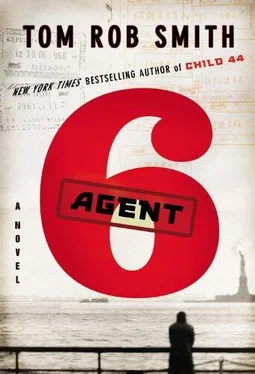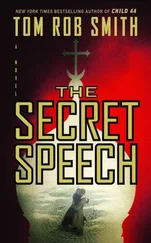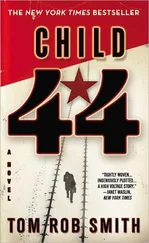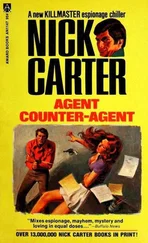Tom Smith - Agent 6
Здесь есть возможность читать онлайн «Tom Smith - Agent 6» весь текст электронной книги совершенно бесплатно (целиком полную версию без сокращений). В некоторых случаях можно слушать аудио, скачать через торрент в формате fb2 и присутствует краткое содержание. Жанр: Триллер, на английском языке. Описание произведения, (предисловие) а так же отзывы посетителей доступны на портале библиотеки ЛибКат.
- Название:Agent 6
- Автор:
- Жанр:
- Год:неизвестен
- ISBN:нет данных
- Рейтинг книги:4 / 5. Голосов: 1
-
Избранное:Добавить в избранное
- Отзывы:
-
Ваша оценка:
- 80
- 1
- 2
- 3
- 4
- 5
Agent 6: краткое содержание, описание и аннотация
Предлагаем к чтению аннотацию, описание, краткое содержание или предисловие (зависит от того, что написал сам автор книги «Agent 6»). Если вы не нашли необходимую информацию о книге — напишите в комментариях, мы постараемся отыскать её.
Agent 6 — читать онлайн бесплатно полную книгу (весь текст) целиком
Ниже представлен текст книги, разбитый по страницам. Система сохранения места последней прочитанной страницы, позволяет с удобством читать онлайн бесплатно книгу «Agent 6», без необходимости каждый раз заново искать на чём Вы остановились. Поставьте закладку, и сможете в любой момент перейти на страницу, на которой закончили чтение.
Интервал:
Закладка:
Diane had seen doctors and therapists y’d said more or the less the same thing. There was something wrong with her nerves. It sounded like the kind of diagnosis written a hundred years ago and Yates couldn’t believe it was being handed out now. Was there a pill that could help? They gave him pills and she’d take them but none of them did any good. In an attempt to remedy the disintegration of their marriage they’d tried for a child. The baby had been lost in pregnancy. Even though Yates had prayed for the strength not to blame Diane, he did: he blamed her for his dead child. He blamed her for the waitress – he blamed her for everything that was rotten about his life because the rot spread from her. He’d wanted the dream, the perfect marriage, children, the perfect home, he’d been able to provide it materially and emotionally, he’d been ready, and she’d trashed it with her craziness. Maybe that was the definition of craziness – to trash a good thing for no reason at all.
He’d arrived at West 145th Street. Parking the car, Yates wound up the window. His was one of only four cars on the street – the kind of Harlem street where no one would notice if a home had been left to ruin and the occupant was a crazy woman who didn’t get out of bed. This was the kind of neighbourhood where Diane belonged. She didn’t deserve their home. There was no greenery here, no parks for the children to play in. The children ran about the streets, jumping in and out of hopscotch chalk outlines that covered the summer-hot tarmac as if the streets were built for them and not for cars. Yates took pause every time he saw these kids. No space to play, no future, no hope – what made him mad were the men sitting around in the doorways, doing nothing, when they should be working, they should be trying to get these children a yard, a front lawn. But they never did anything, huddled in conversations, as though they had important matters to discuss. It was a joke, the seriousness with which the dropouts would sit around and talk while old women, as old as seventy, carried heavy bags of shopping. Yates never saw them move to help, never saw them offer to carry the bags or open the door. He was convinced they looked down on work. Work was beneath them. It was the only explanation.
Stepping out of the car, the heat was oppressive. The redbrick houses soaked up every bit of the sun but the summer wasn’t pleasant like it was in Teaneck, it was a sickly heat, like a tropical fever. If the main streets were dirty, the alleys were something else, piled up with trash like they were waiting for a flood to wash it all away. Not such a bad idea, Yates thought, a flood, an almighty deluge, maybe it could take some of these layabout losers at the same time. He crossed the street, feeling everyone’s eyes on him, hundreds of eyes squinting at him in the sunlight. Kids stopped playing. Men stopped their conversations, following him with controlled dislike, not expressive enough to get themselves into trouble, just enough to make it clear they hated him. Let them hate him! Let them think his opinions had to do with the colour of their skin. But the truth was that he didn’t care what colour their skin was: he cared what kind of men they were – the colour of their soul. And a man worked. He tried to make his country a better place. He wanted to tell them that a man without a job wasn’t a man, and yet he was sure that they wouldn’t get it. They were alien to him, as surely as those Soviet Communists were.
Yates had worked for COINTELPRO, the FBI Counter-Intelligence Program, since its inception in 1956. Over the past nine years he’d become one of the programme’s leading agents, making his name hindering the efforts of the National Committee to Abolish HUAC – the House Committee on Un-American Activities. A committee tobolish a committee: but those activists hadn’t the wit to even spot the ridiculousness of their name, let alone their entire enterprise. They were too busy arguing for the rights of traitors, engaged in an abstract academic debate about how the individual’s rights were more important than the well-being of their society. He would’ve thought Communists would understand that the needs of the many outweighed the needs of the few. They had no interest in the fact that there were real plots intended to do real harm against his country. They dismissed those arguments as scaremongering. Their complacency disgusted him. He’d seen the plots, the plans – he understood their way of life was hated by a powerful enemy and needed protecting.
He’d been rapidly promoted to dealing with CPUSA, the Communist Party of America. The party’s membership was in decline. He wasn’t sure whether this was due to new members being ordered underground. They weren’t taking any chances. COINTELPRO wanted the party dead. Nothing else would satisfy them. The new leader of CPUSA, Gus Hall, had been trained at the International Lenin School in Moscow and COINTELPRO had no intention of giving him the space to expand the organization’s public profile, or create a secret network that could better evade the range of measures deployed against it. There were several methods open to them: infiltration, psychological warfare, legal harassment – such as tax, sending in the IRS to go over every scrap of paper, searching for the smallest of mistakes. They could deploy the local police force and finally but importantly use non-legal harassment. He didn’t get involved in that: it was farmed out to retired officers or people with no connection to the FBI. He had no qualms with it, of course. According to Hoover: The purpose of counterintelligence action is to disrupt and it is immaterial whether facts exist to substantiate the charge.
As COINTELPRO officers they were tasked with pinpointing and neutralizing troublemakers before they could exercise their potential for violence. And Yates was one of the best.
Entering the stairway of a redbrick five storey, the temperature seemed to jump. It was so hot Yates had to stop, taking out a handkerchief and mopping his brow. The smells were bad, mingled odours he didn’t want to think about too much. Walking up the stairs, his pores seeping alcohol from last night, he surveyed the cracked plaster and broken floorboards, the shabby pipes and doors held together with mismatched planks of wood and cardboard, no doubt kicked apart in some argument or other. Yates could sense the hostility from the people in the walkways, people milling in the communal spaces, with no jobs to go to, no skills to offer, just an inbred sense of injustice. They’d talk for twenty-four hours a day about how they’d been wronged and how their country had failed them. At least twenty per cent of CPUSA membership was estimated to be Negro, far higher than the Negro proportion of the national population – that was their solution to not getting a job, ripping down the whole edifice of their nation. He smiled at them as he passed, knowing full well it would drive them crazy. Hatred radiated from their faces like heat off hot coals. If they thought it bothered him they were wrong. He wanted to ask the young man perched on the window: You think your hatred matters?
Of all the hatred in the world, theirs mattered the least.
At the top of the stairs, Yates knocked on the door. He’d been on the threshold of this apartment before although he’d never been invited inside. He would have authorized a search of the premises but it was impossible to do anything without the neighbours knowing, they all lived on top of each other, in and out of each other’s apartments. Personally, he didn’t care if they knew. He didn’t see any need to be subtle about it. He’d been tempted to authorize it anyway, not expecting to find anything, but as part of the psychological warfare. The issue of race had stopped him. He was told that an illegal search might inflame relations between the community and the police. They couldn’t even make it look like a burglary since realistically no one would rob a shit-hole like this.
Читать дальшеИнтервал:
Закладка:
Похожие книги на «Agent 6»
Представляем Вашему вниманию похожие книги на «Agent 6» списком для выбора. Мы отобрали схожую по названию и смыслу литературу в надежде предоставить читателям больше вариантов отыскать новые, интересные, ещё непрочитанные произведения.
Обсуждение, отзывы о книге «Agent 6» и просто собственные мнения читателей. Оставьте ваши комментарии, напишите, что Вы думаете о произведении, его смысле или главных героях. Укажите что конкретно понравилось, а что нет, и почему Вы так считаете.












